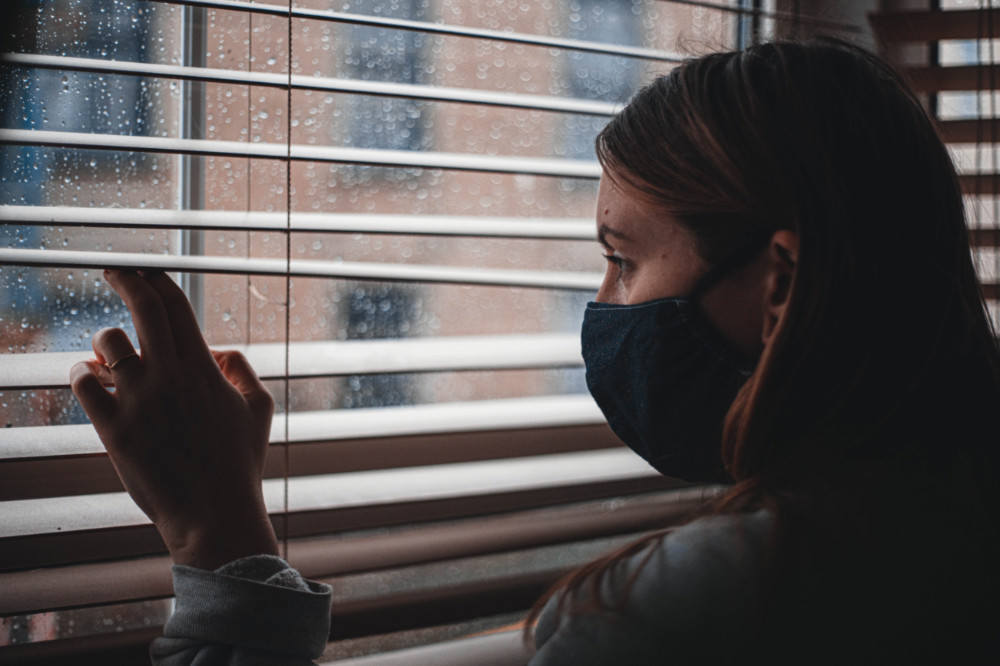
TIM COSTELLO reflects on the growing issue of anxiety in Australia, particularly during the coronavirus pandemic – and why it might be worse than in previous pandemics…
I opened my daily paper here in Melbourne last Thursday to read two opinion pieces on opposite pages which honed in on the epidemic of anxiety which is beleaguering our nation.
One article, written in the lead-up to a Women’s March for Justice in Canberra and so many other towns on Monday, highlighted the impact of COVID-19 on women, particularly in terms of anxiety, mental health and suicidal thoughts. It listed the gendered impacts of the pandemic, such as women suffering job losses at twice the rate of men and a much greater proportion of women facing the stress of being in front line jobs. It stated that more women have contracted the virus – and died in greater numbers.

Anxiety is on the rise – and Tim Costello says this reveals something about what is absent in many of our lives, our separation from God. PICTURE: Hedgehog Digital/Unsplash.
The opposite article was about our children. It cited the results of a survey conducted with 700 Australian primary school principals which showed how anxiety and stress have accelerated amongst students with increasing numbers being withdrawn, or aggressive or unable to stay on a task. Both authors suggested that more funding would assuage this crisis: funding for women’s employment and more funding for more psychologists, social workers and youth workers in primary schools was the avenue to address anxiety.
All this in a nation that, by global standards, has fared well in the tumultuous year the pandemic has unleashed upon the world. Australia has been blessed with good leadership which has depended on medical and scientific advice rather than political posturing. Rather than a focus on the ‘I’, emphasising maskless libertarians and demands to stay open, we have discovered more of the ‘we’ or ‘us’. It doesn’t end for anyone of us until it ends for all of us.
“Whilst we have had massive government support for jobs and the unemployed, and charities have seen increased levels of support for their work to feed and house the vulnerable, there still seems to be a hole at the centre of our psyche and maybe even the fabric of our society.”
So our governments have taken steps to isolate all who have been exposed, to trace aggressively the track of infections and to limit the virus coming across our borders through strict quarantining. Being a nation continent has given us an advantage of throwing up the barricades around our large island, something which has stood us in great stead during these times. And now, although behind the US and the UK in vaccine rollout, we are seeing the most vulnerable get vaccinated in a national campaign to shore up our defences.
But still anxiety rages – in our homes, our schools, our workplaces. Our hospital and medical staff have been under enormous pressure over many months – even though the actual death rates have been proportionally low. One hospital social worker I know well, working in Melbourne, related how she heard the suppressed talk of a group of doctors and nurses about their nightmares and loss of sleep. The threat of a virus that can kill is insidious in terms of creating fear and anxiety.
I thought about previous pandemics that have bedeviled the globe. No doubt much anxiety accompanied the spread of the Spanish Flu from 1918. History is replete with stories of plagues and epidemics. I am sure that anxiety would have accompanied every one of them. And they had far fewer healthcare options and government aid to cater for economic vulnerability.
But there does seem to be one difference in these times. Whilst we have had massive government support for jobs and the unemployed, and charities have seen increased levels of support for their work to feed and house the vulnerable, there still seems to be a hole at the centre of our psyche – maybe even in the fabric of our society.
I put it down to a spiritual angst in terms of what is holding us together in the face of adversity. It is more about what is absent. And that is trust in God. Many read the Genesis story where the author pronounces with each act of creation that God saw “it was good”. The first time God pronounces that something is not good in the Genesis story is when He says it is not good for man to be alone.
Loneliness and anxiety are siblings. Most of us read the account of a serpent and the eating of the forbidden fruit in the Garden as one of disobedience and punishment. True, but I think this punishment speaks more of separation and anxiety. Adam and Eve are separated from God, their source of meaning, and exiled from their garden home. Anxiety is as old and chronic in the human condition as the Garden of Eden.
Yes, we may need more funding in lots of areas but the deeper angst of separation from a relationship with our Maker and loss of a spiritual home is profound. As Friedrich Nietzsche said: “He who has a why to live can bear almost any how”. The ‘why’ of knowing our deepest purpose and our deepest spiritual relationship builds resilience. That lodestar is not solved by funding.






